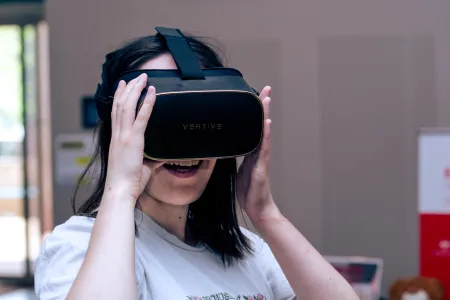Study finds AI can predict cybersickness in VR users
Artificial Intelligence (AI) could be used to help combat nausea, headaches and dizziness among virtual reality (VR) users and make the technology more accessible, according to a new study with Charles Darwin University (CDU).
The study by CDU and Torrens University researchers explored using AI techniques and machine learning algorithms to predict cybersickness for potential users of VR technology with headsets. The study was conducted by Fawad Zaidi, Associate Professor Niusha Shafiabady and Emeritus Professor Justin Beilby.
Questionnaire data was split into two groups: people who will experience cybersickness symptoms within minutes of using VR devices, and people who wouldn’t have issues with using VR devices.
The data was processed through Ai-Labz, created by study co-author and CDU Faculty of Science and Technology Associate Professor Niusha Shafiabady. Results revealed AI could predict discomfort among VR users with 93 per cent accuracy.
Associate Professor Shafiabady said with growing use and need of VR technology, being able to effectively predict and prevent cybersickness was crucial.
“Most of the people feel discomfort after having a VR experience and having the ability to predict the occurrence of cybersickness for an individual, helps the VR developers and manufacturers to come up with solutions and take preemptive actions to create a better experience for the VR users and address the issues causing it,” she said.
“In the era of technology and especially after the Covid-19 pandemic, the need for remote access and virtual education has grown significantly. Cybersickness is one of the factors that hinders the users from using VR devices because of the great discomfort due to the VR experience.”
Associate Professor Shafiabady said the next step could be to use eXplainable AI algorithms to explore why the AI algorithms made its predictions, giving developers and manufacturers reason why users will have discomfort.
“We are moving towards the times where we use VR devices for essential activities such as servicing manufacturers remotely and teaching, to less essential but more fun activities like looking into the outer space through VR lens,” she said.
“In the era of technology, the VR users should be able to get the benefits of technology without suffering.”
The study, ‘Identifying presence of cybersickness symptoms using AI-based predictive learning algorithms’ was published in journal Virtual Reality.
Read the full study here.
Related Articles

First “hype cycle” of AI development put tech above humans
Users around the world have rushed to adopt artificial intelligence - especially in safety-critical fields - but a new study has revealed the hype has prioritised technology for technology’s sake instead of human-centred development.
Read more about First “hype cycle” of AI development put tech above humans
Nanoplastics hindering cognitive abilities of fish, international research shows
Nanoplastic exposure can impair the cognitive abilities of fish and could lead to significant impacts on marine species’ ability to survive, according to a new international study.
Read more about Nanoplastics hindering cognitive abilities of fish, international research shows
New project to grow Indigenous aquaculture on one of Australia’s largest islands
An Australian island’s efforts to improve food security and transition into a blue economy will be bolstered by a new project to propagate a nutritious and increasingly popular fish.
Read more about New project to grow Indigenous aquaculture on one of Australia’s largest islands
